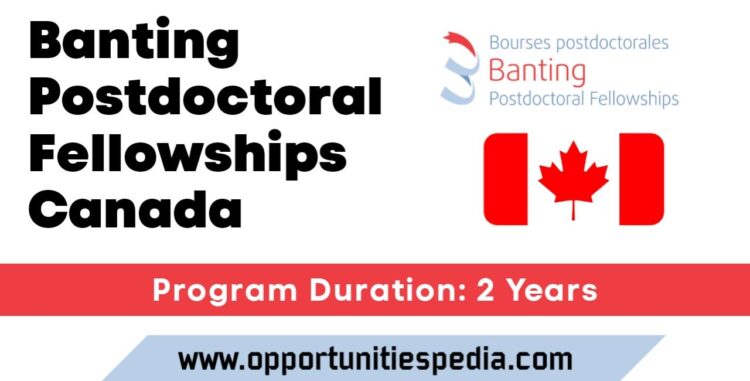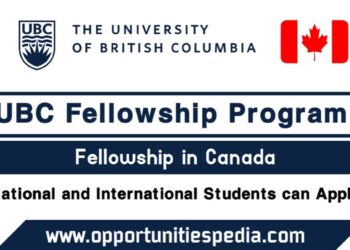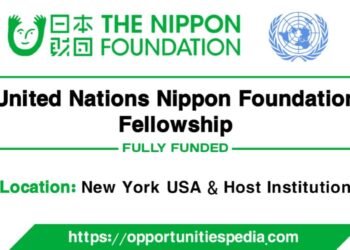Looking to advance your academic career in Canada? Explore the Banting Postdoctoral Fellowships Program 2024-25, a prestigious opportunity for outstanding researchers. With its focus on fostering excellence in health research, natural sciences, engineering, social sciences, and humanities, this program attracts top-tier talent from around the globe. As you embark on your postdoctoral journey, the Banting Fellowship provides a supportive environment, ample resources, and invaluable networking opportunities to propel your research forward.
Apply for the Banting Postdoctoral Fellowships Program 2024-25 and access unparalleled support for your research endeavors. This esteemed program offers generous funding and flexible terms, empowering fellows to pursue innovative projects across various fields. Whether you’re exploring biomedical advancements or delving into social sciences, the Banting Fellowship provides the autonomy and resources to drive meaningful discoveries. Don’t miss your chance to become part of Canada’s thriving research community and shape the future of your field.
Unlock doors to academic excellence with the Banting Postdoctoral Fellowships Program 2024-25 in Canada. As a Banting fellow, you’ll immerse yourself in a dynamic environment conducive to groundbreaking research. Seize this opportunity to collaborate with leading scholars, access state-of-the-art facilities, and receive mentorship from renowned experts in your field. With a strong emphasis on interdisciplinary collaboration and innovation, the Banting Fellowship equips fellows with the skills and support needed to excel in academia and beyond. Apply now and embark on a transformative research journey. You can also apply for Rotary Peace Fellowship Program 2025 (Fully Funded)
Banting Postdoctoral Fellowships 2024-25 in Canada Details:
- Fellowship Host Country: Canada
- Offered By: Government of Canada
- No of Fellowships: 70 fellowships per annum
- Program Duration: 2 years
- Eligibility: National and International
- Deadline: 17 September 2024.
Check Bonn SDG Fellowships in Germany 2025 (Funded)
Benefits of the Banting Fellowships in Canada:
- Financial support: The Banting Postdoctoral Fellowships offer financial support of $70,000 per year for two years, which is a significant amount for postdoctoral researchers. This funding can be used for research expenses, travel, and living expenses.
- Flexibility: Banting Fellows have the flexibility to conduct their research at any Canadian university or research institution of their choice. This allows them to work with leading researchers and access cutting-edge facilities and resources.
- Career development: The Banting Fellowships provide a unique opportunity for postdoctoral researchers to advance their careers by working on innovative research projects and developing new skills. The fellowship provides a supportive environment for postdoctoral researchers to publish research papers, collaborate with other researchers, and establish their independent research program.
- Networking opportunities: Banting Fellows have the opportunity to interact with other postdoctoral researchers from diverse backgrounds and disciplines. This provides a unique opportunity for networking, collaboration, and building long-lasting relationships.
- Recognition: The Banting Postdoctoral Fellowships are highly competitive, and receiving the award is a significant accomplishment. Being awarded the fellowship provides recognition and prestige that can be leveraged for future career opportunities.
Eligibility Criteria of the Banting Fellowships 2024-25:
- Candidates must have obtained their PhD, PhD equivalent of a health professional degree.
- Candidates who are not Canadian citizens or permanent residents of Canada can hold the fellowship only in Canadian institutes.
- Only those students are eligible who are nominated by the host institutions.
- Candidates must fulfill all other requirements for Banting Fellowships.
Deadline:
The application deadline to apply for the Banting postdoctoral fellowship 2024-25 in Canada is September 17, 2024
(20:00 EDT).
Check Miami University Presidential Fellowship Program in the USA 2024 (Fully Funded)
How to apply for the Banting Postdoctoral Fellowships 2024-25?
- You have to apply through a ResearchNet account.
- You should read the Selection committee guide before commencing your application.
- Identify an area of research
- identify participants
- Fulfillment of degree requirements forms
- Identify referees
- Enter degree information.
- Enter proposal information and supporting documents
- Research proposal
- Institutional letter of endorsement
- Supervisor’s statement.




















Discussion about this post